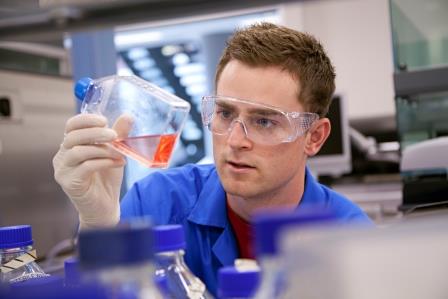Monash unlocks new potential treatment opportunities for leukemia patients
The long-term survival of people suffering from chronic lymphocytic leukemia (CLL) could be increased with the development of new therapeutic strategies.

Ground-breaking research by Monash University Professor Fabienne Mackay from the Department of Immunology and PhD student Damien Easton-Saulep has been released recently in the prestigious journal Leukemia that uncovers never before reported aspects of CLL.
Becoming increasingly more prevalent, CLL is the most common leukemia in the developed world and has no cure.
Funded by the Association for International Cancer Research (AICR) and National Health and Medical Research Centre (NHMRC), Professor Mackay’s research found that key cells called “plasmacytoid dendritic cells,” which are important for fighting infections and stimulating other immune cells in the destruction of tumor and infected cells, are actually eliminated in people with aggressive CLL.
Professor Mackay said CLL patients with a milder form of CLL appeared to have more of these rare cells, suggesting some protective effect.
“These unprecedented findings reveal that these rare but critical cells can be restored at the experiment level, resulting in re-activated immune functions including the destruction of cancer cells,” Professor Mackay said.
“These results provide supporting evidence that a similar approach might have therapeutic benefits in patients with CLL. In healthy people, the immune system usually helps detect and destroy cancer cells or infected cells as soon as they arise.
“In some people, cancer cells are able to disable the immune system and as a result these people are more vulnerable to severe infections and no longer capable of controlling the emergence of cancer cells.”
Professor Mackay said these people were typically more vulnerable to infections because the immune system was disabled.
“It is hoped that these discoveries will be an important turning point for the development of new therapeutic strategies that reactivate the immune system, and enhance the long-term survival of CLL patients particularly vulnerable to fatal complications with infections.”
About the Monash University Medical School Program
The Monash Medical School’s graduate-entry degree emphasizes clinical communication skills and early clinical contact visits to medical practices, community care facilities and hospitals. The Bachelor of Medicine Bachelor of Surgery (MBBS) curriculum is designed as an integrated structure incorporating four themes, within which semester-long units are taught by staff from a range of departments across the faculty in an interdisciplinary fashion.
Program: Bachelor of Medicine Bachelor of Surgery (MBBS)
Location: Gippsland Campus, Churchill, Victoria (approx. 2 hours southeast of Melbourne)
Semester intake: February 2015
Duration: 4 years
Application deadline: September 26, 2014
Have you just completed high school? Will you be finishing high school soon? Check out Monash University Medical School’s undergraduate medical program!
Have you already completed an undergraduate degree? Then Monash University Medical School’s graduate medical program is for you!

































Ask A Question
Ask us about your program of interest, or if you have a question about our services.
CONTACT US TODAY